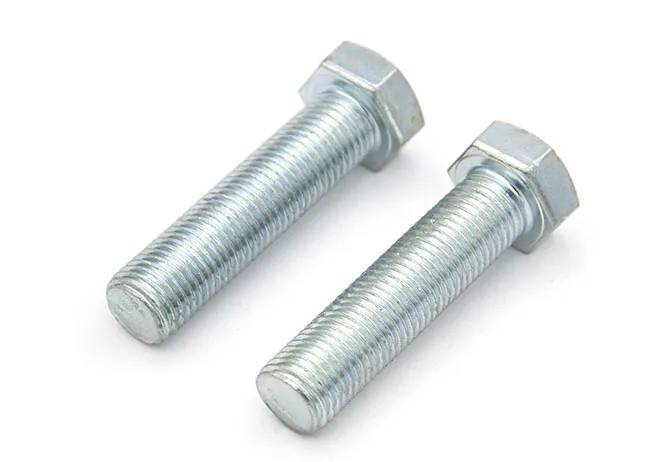High-Quality OEM M8 Bolts for Reliable Automotive and Machinery Applications
Nov . 10, 2024 10:34 Back to list
High-Quality OEM M8 Bolts for Reliable Automotive and Machinery Applications
Understanding OEM M8 Bolts A Comprehensive Guide
In the world of mechanical engineering and manufacturing, the specifics of hardware component selection can make a significant difference in product quality and performance. Among the various types of fasteners used in assembly processes, OEM M8 bolts stand out due to their widespread application and reliability. In this article, we will dive into what OEM M8 bolts are, their specifications, advantages, and their applications in different industries.
What are OEM M8 Bolts?
OEM stands for Original Equipment Manufacturer. This term is often used in the context of components that are produced by a manufacturer to be used in the assembly of another company's products. OEM M8 bolts refer specifically to bolts with a metric thread diameter of 8 millimeters, following the standards set forth by the International Organization for Standardization (ISO).
M8 bolts are characterized by their 8mm diameter, with varying lengths and thread pitches that can fit a wide range of applications. They can be made from various materials, including steel, stainless steel, and even titanium, depending on the requirements of the application they are intended for.
Specifications of M8 Bolts
1. Diameter As mentioned, M8 bolts have a diameter of 8 mm. 2. Thread Pitch The most common thread pitch for M8 bolts is 1.25 mm, although finer threads, such as 1.0 mm, can also be found for specific applications. 3. Length M8 bolts come in various lengths, typically ranging from 10 mm to 100 mm or more, allowing them to be utilized in diverse assembly scenarios. 4. Material The choice of material can affect not only strength and durability but also the resistance to corrosion and environmental factors. Common materials include carbon steel, alloys, and stainless steel. 5. Coatings Many M8 bolts come with coatings, such as zinc plating, to enhance corrosion resistance.
oem m8 bolts

Advantages of Using OEM M8 Bolts
1. Quality Assurance OEM parts are produced to meet specific quality standards, ensuring consistency in performance and reliability. 2. Compatibility M8 bolts are compatible with a variety of components and materials, which makes them suitable for a wide range of applications. 3. Availability Given their common usage, OEM M8 bolts are widely available, making procurement straightforward and minimizing lead times for manufacturers. 4. Customization Manufacturers can often customize the specifications of OEM M8 bolts to suit particular assembly needs, whether that involves unique thread patterns, lengths, or materials.
Applications of OEM M8 Bolts
The versatility of OEM M8 bolts allows them to be employed in numerous sectors, including
1. Automotive Industry In vehicles, these bolts are often used to secure engine components, chassis, and body panels, where strong and reliable fastening is critical. 2. Aerospace M8 bolts in aerospace applications must meet stringent safety standards, often being made from high-strength materials that can withstand extreme environmental conditions. 3. Construction In construction, M8 bolts are used in structures ranging from bridges to buildings, where they contribute to the overall stability and safety of the construction. 4. Electronics Many electronic devices utilize M8 bolts for assembly and housing, ensuring components are held securely in place.
Conclusion
The importance of OEM M8 bolts in various industries cannot be overstated. Their standardized specifications, combined with the assurance of quality that comes with OEM production, make them a preferred choice for manufacturers and engineers. Whether you are working in automotive manufacturing, construction, or any other sector that requires high-quality fasteners, understanding the specifications and applications of M8 bolts will aid in selecting the right components for your projects. As technology advances and industries evolve, the demand for reliable fasteners like OEM M8 bolts will remain a cornerstone of engineering practices worldwide.
Latest news
-
High-Quality Panel Stud Bolt Reliable Panel Stud Bolt Factory & Suppliers
NewsJul.08,2025
-
High-Precision Fine Thread Locknuts Manufacturer & Supplier Custom Solutions
NewsJul.08,2025
-
PH Imperial Stud Bolt – High Strength Fasteners from Leading Supplier & Factory
NewsJul.07,2025
-
High-Quality Allen Wrench Bolts Leading Factory, Company & Suppliers
NewsJul.07,2025
-
Wholesale Ball Stud Bolt - High Quality Supplier & Factory Price Reliable Wholesale Ball Stud Bolt Company
NewsJul.06,2025
-
High-Strength Alloy Bolts Manufacturer & Supplier Quality Alloy Fasteners Factory
NewsJul.06,2025
